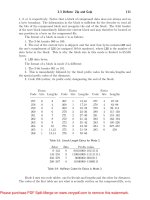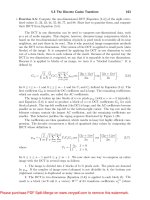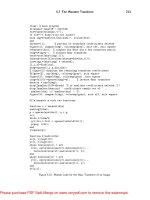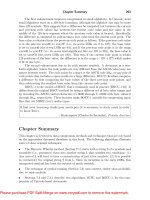- Trang chủ >>
- Khoa Học Tự Nhiên >>
- Vật lý
a contemporary introduction to free will mar 2005
Bạn đang xem bản rút gọn của tài liệu. Xem và tải ngay bản đầy đủ của tài liệu tại đây (1.51 MB, 208 trang )
FUNDAMENTALS OF PHILOSOPHY SERIES
Series Editors
John Martin Fischer, University of California, Riverside
John Perry, Stanford University
Mind: A Brief Introduction
John R. Searle
Biomedical Ethics
Walter Glannon
A Contemporary Introduction to Free Will
Robert Kane
kane42077_fm.qxd 1/19/05 16:27 Page ii
A CONTEMPORARY
INTRODUCTION TO
Free Will
c
ROBERT KANE
University of Texas at Austin
New York ◆ Oxford
OXFORD UNIVERSITY PRESS
2005
kane42077_fm.qxd 1/19/05 16:27 Page iii
Oxford University Press
Oxford New York
Auckland Bangkok Buenos Aires Cape Town Chennai
Dar es Salaam Delhi Hong Kong Istanbul Karachi Kolkata
Kuala Lumpur Madrid Melbourne Mexico City Mumbai Nairobi
São Paulo Shanghai Taipei Tokyo Toronto
Copyright © 2005 by Oxford University Press, Inc.
Published by Oxford University Press, Inc.
198 Madison Avenue, New York, New York 10016
www.oup.com
Oxford is a registered trademark of Oxford University Press
All rights reserved. No part of this publication may be reproduced,
stored in a retrieval system, or transmitted, in any form or by any means,
electronic, mechanical, photocopying, recording, or otherwise,
without the prior permission of Oxford University Press.
ISBN-13: 978-0-19-514969-2 (alk. paper)—
ISBN-13: 978-0-19-514970-8 (pbk.: alk. paper)
ISBN-10: 0-19-514969-6 (alk. paper)—ISBN-10: 0-19-514970-X (pbk.: alk. paper)
Printing number: 9 8 7 6 5 4 3 2 1
Printed in the United States of America
on acid-free paper
kane42077_fm.qxd 1/19/05 12:13 PM Page iv
Oxford University Press
Oxford New York
Auckland Bangkok Buenos Aires Cape Town Chennai
Dar es Salaam Delhi Hong Kong Istanbul Karachi Kolkata
Kuala Lumpur Madrid Melbourne Mexico City Mumbai Nairobi
São Paulo Shanghai Taipei Tokyo Toronto
Copyright © 2005 by Oxford University Press, Inc.
Published by Oxford University Press, Inc.
198 Madison Avenue, New York, New York 10016
www.oup.com
Oxford is a registered trademark of Oxford University Press
All rights reserved. No part of this publication may be reproduced,
stored in a retrieval system, or transmitted, in any form or by any means,
electronic, mechanical, photocopying, recording, or otherwise,
without the prior permission of Oxford University Press.
Library of Congress Cataloging-in-Publication Data
Kane, Robert, 1938-
A contemporary introduction to free will / by Robert Kane.
p. cm. (Fundamentals of philosophy series)
Includes bibliographical references.
ISBN-13: 978-0-19-514969-2 (alk. paper)—
ISBN-13: 978-0-19-514970-8 (pbk.: alk. paper)
ISBN-10: 0-19-514969-6 (alk. paper)—ISBN-10: 0-19-514970-X (pbk.: alk. paper)
1. Free will and determinism. I. Title. II. Fundamentals of
philosophy (Oxford, England)
BJ1461.K365 2005
123'.5 dc22
2005000944
Printing number: 9 8 7 6 5 4 3 2 1
Printed in the United States of America
on acid-free paper
kane42077_fm.qxd 1/25/05 10:28 AM Page iv
v
ACKNOWLEDGMENTS vii
1 The Free Will Problem 1
2 Compatibilism 12
3 Incompatibilism 23
4 Libertarianism, Indeterminism, and Chance 32
5 Minds, Selves, and Agent Causes 40
6 Actions, Reasons, and Causes 53
7 Is Free Will Possible? Hard Determinists and Other Skeptics 67
8 Moral Responsibility and Alternative Possibilities 80
9 Higher-order Desires, Real Selves, and New Compatibilists 93
10 Reactive Attitude Theories 107
11 Ultimate Responsibility 120
12 Free Will and Modern Science 132
13 Predestination, Divine Foreknowledge, and Free Will 147
14 Conclusion: Five Freedoms 163
NOTES 175
INDEX 185
Contents
kane42077_fm.qxd 1/19/05 16:27 Page v
kane42077_fm.qxd 1/19/05 16:27 Page vi
Acknowledgments
All the authors whose writings are cited or discussed in this work have
had an impact on my thinking about free will and hence on this book.
I would like to specifically thank those who offered helpful comments on
earlier drafts of the manuscript, especially Robert Miller (the Oxford
editor of this series), Michael McKenna, Carl Ginet, John Martin Fischer,
Christopher Panza, Ulrike Heuer, and several anonymous reviewers for
Oxford University Press. Finally, I would like to thank Claudette Kane,
whose critical eye and careful editing are everywhere in evidence in
this work.
vii
kane42077_fm.qxd 1/19/05 16:27 Page vii
kane42077_fm.qxd 1/19/05 16:27 Page viii
A CONTEMPORARY
INTRODUCTION TO
Free Will
kane42077_fm.qxd 1/19/05 16:27 Page ix
kane42077_fm.qxd 1/19/05 16:27 Page x
CHAPTER 1
c
The Free Will Problem
1
1. Introduction
“There is a disputation that will continue till mankind is raised from the dead,
between the necessitarians and the partisans of free will.”
These are the words of Jalalu’ddin Rumi, twelfth-century Persian poet and
mystic. The problem of free will and necessity (or determinism), of which
he speaks, is one of the most difficult and “perhaps the most voluminously
debated of all philosophical problems,” according to a recent history of
philosophy. Debates about free will have affected and been affected by
both religion and science.
In his classic poem Paradise Lost, John Milton describes the angels de-
bating how some of them could have sinned of their own free wills given
that God had made them intelligent and happy. Why would they have done
it? And why were they responsible for their sins rather than God, since
God had made them the way they were and had complete foreknowledge
of what they would do? While puzzling over such questions even the an-
gels, according to Milton, were “in Endless Mazes lost” (not a comforting
thought for us humans).
On the scientific front, issues about free will lead us to ask about the na-
ture of the physical universe and our place in it (Are we determined by
physical laws and movements of the atoms?), about human psychology
and the springs of action (Can our actions be predicted by those who know
our psychology?), and about social conditioning (Are we determined to
be the kinds of persons we are by heredity and environment, birth and
upbringing?).
kane42077_ch01.qxd 1/11/05 14:16 Page 1
In philosophy, debates about free will lead to issues about crime and
punishment, blameworthiness and responsibility, coercion and control,
mind and body, necessity and possibility, time and chance, right and
wrong, and much more. In consequence, the free will problem is not fitted
easily into one area of philosophy. It touches ethics, social and political
philosophy, philosophy of mind, metaphysics, theory of knowledge, phi-
losophy of law, philosophy of science, and philosophy of religion.
To understand what this “problem of free will” is and why it has
puzzled so many minds for centuries, the best way to begin is with two
familiar notions we all understand—or think we understand—freedom
and responsibility.
2. Freedom
Nothing could be more important than freedom to the modern age. All
over the world, people clamor for freedom; and the trend (in spite of fre-
quent violent resistance to it) is toward societies that are more free. But
why do we want freedom? The simple, and not totally adequate, answer is
that to be more free is to be able to satisfy more of our desires. In a free so-
ciety, we can buy what we want and travel where we please. We can
choose what movies to see, what books to read, whom to vote for.
But these freedoms are what you might call surface freedoms. What we
mean by free will runs deeper than these ordinary freedoms. To see how,
suppose we had maximal freedom to make choices of the kinds just noted
to satisfy our desires, yet the choices we actually made were in fact ma-
nipulated by others, by the powers that be. In such a world we would have
a great deal of everyday freedom to do whatever we wanted, yet our free-
dom of will would be severely limited. We would be free to act or to
choose what we willed, but we would not have the ultimate power over
what it is that we willed. Other persons would be pulling the strings, not
by coercing or forcing us to do things against our wishes, but by manipu-
lating us into having the wishes they wanted us to have.
Now it may occur to you that, to some extent, we do live in such a
world, where we are free to make choices but may be manipulated into
making many of them by advertising, television, spin doctors, salesper-
sons, marketers, and sometimes even by friends, parents, relatives, rivals,
or enemies. One sign of how important free will is to us is that people feel
revulsion at such manipulation and feel demeaned by it when they find out
it has been done to them. They realize that they may have thought they
were their own persons because they were choosing in accord with their
own desires and purposes, but all along their desires and purposes had
2 FREE WILL
kane42077_ch01.qxd 1/11/05 14:16 Page 2
been manipulated by others who wanted them to choose exactly as they
did. Such manipulation is demeaning because, when subjected to it, we re-
alize we were not our own persons; and having free will is about being
your own person.
The problem is nicely illustrated by twentieth-century utopian novels,
such as Aldous Huxley’s Brave New World and B. F. Skinner’s Walden
Two. (You may be familiar with more recent films or science fiction works
with similar themes.) In the futuristic societies described in these classic
works, people can have and do what they will or choose, but only to the
extent that they have been conditioned since birth by behavioral engineers
or neurochemists to will or choose what they can have and do. In Brave
New World, the lower-class workers are under the influence of powerful
drugs, so that they do not think about things they cannot have. They are
quite content to play miniature golf all weekend. They can do what they
want, but their wants are limited and controlled by drugs.
The citizens in Skinner’s Walden Two have it better than the workers in
Brave New World. Yet the desires and purposes of those who live in Walden
Two are also covertly controlled, in this case by behavioral engineers.
Citizens of Walden Two live collectively in what can be described as a rural
commune; and because they share duties of farming and raising children,
they have plenty of leisure. They pursue arts, sciences, and crafts, engage
in musical performances, and enjoy what appears to be a pleasant exis-
tence. Indeed, the leading figure of the novel, a fellow named Frazier, who
founded Walden Two, forthrightly says that their pleasant existence is
brought about by the fact that, in his community, persons can do whatever
they want or choose because they have been behaviorally conditioned since
childhood to want and choose only what they can have and do.
Frazier then adds provocatively that, in his view, Walden Two “is the
freest place on earth,” since people there can choose and do anything they
want. And in a sense he is right. There is no need for coercion in Walden
Two or for punishment (there are no prisons). No one has to be forced to
do anything against his or her will. No one harasses the citizens, and no
one has to harass them. Yet we might wonder whether Walden Two is the
freest place on earth. Is all this surface freedom in Walden Two not
brought about at the expense of a deeper freedom of the will? The citizens
of Walden Two can indeed do anything they want or will to do, but they do
not have the ultimate say about what it is that they want or will. Their wills
are determined by factors they do not control. Such an objection is in fact
made by one of Frazier’s critics in the novel, a philosopher named Castle
who visits Walden Two.
But Frazier is untroubled by Castle’s criticism. He admits that this sup-
posedly deeper freedom of the will does not exist in Walden Two but
The Free Will Problem 3
kane42077_ch01.qxd 1/11/05 14:16 Page 3
argues that it is no real loss. Echoing the novel’s author, B. F. Skinner (who
was a foremost defender of behaviorism in psychology), Frazier thinks this
so-called freedom of the will—the freedom that Castle and other philoso-
phers have trumpeted for centuries—is an illusion. We do not and cannot
have such a freedom anyway, he says, inside or outside Walden Two. In our
ordinary lives, we are just as much the products of upbringing and social
conditioning as the citizens of Walden Two, though we may delude our-
selves into thinking otherwise. We may think we are the creators or origi-
nators of our own wills only because we are unaware of most of the
genetic, psychological, and social factors that influence us. Moreover, the
idea that we could be ultimate or “original” creators of our own wills—that
we could somehow be “causes of ourselves”—is an impossible ideal, ac-
cording to Frazier. If we trace the psychological springs of actions back to
their origins—back to childhood, say—we find that we were less free then,
not more.
Thus the gauntlet is thrown down by Frazier—echoing Skinner and
many other modern thinkers: the so-called deeper freedom of the will is an
illusion dreamt up by philosophers and theologians before we understood
more about the hidden causes of behavior. It is an outdated idea that has no
place in modern scientific picture of the world or of human beings. (Note
that the philosopher who defends this “outdated” notion in Walden Two is
given the medieval-sounding name “Castle.”) Why sacrifice the everyday
freedoms that really matter to us—freedoms from coercion, punishment,
constraint, oppression, and the like—for an illusory freedom of the will
that we cannot have anyway?
3. Responsibility
Reflecting in this way on the idea of freedom is one path to the free will
problem. Another path is accessed by reflecting on the notion of responsi-
bility. Free will is also intimately related to notions of accountability,
blameworthiness, and praiseworthiness for actions.
Suppose a young man is on trial for an assault and robbery in which the
victim was beaten to death. Let us say we attend his trial and listen to the
evidence in the courtroom. At first, our attitude toward the defendant is
one of anger and resentment. What the young man did was horrible. But as
we listen daily to how he came to have the mean character and perverse
motives he did have—a sad story of parental neglect, child abuse, sexual
abuse, and bad role models—some of our resentment against the defen-
dant is shifted over to the parents and others who abused and mistreated
him. We begin to feel angry with them as well as with him. (Note how
4 FREE WILL
kane42077_ch01.qxd 1/11/05 14:17 Page 4
natural this reaction is.) Yet we aren’t quite ready to shift all the blame
away from the young man himself. We wonder whether some residual re-
sponsibility may not belong to him. Our questions become: To what extent
is he responsible for becoming the sort of person he now is? Was his be-
havior all a question of bad parenting, societal neglect, social condition-
ing, and the like, or did he have any role to play in choosing it?
These are crucial questions about free will, and they are questions about
what may be called the young man’s ultimate responsibility. We know that
parenting and society, genetic makeup and upbringing, have an influence
on what we become and what we are. But were these influences entirely
determining, or did they “leave anything over” for us to be responsible
for? That is what we want to know about the young man. The question of
whether he is merely a victim of bad circumstances or has some residual
responsibility for being what he is—the question, that is, of whether he
became the person he is of his own free will—seems to depend on whether
these other factors were or were not entirely determining.
4. Determinism and Necessity
The problem of free will arises in human history when, by reflections such
as these, people are led to suspect that their actions might be determined
or necessitated by factors unknown to them and beyond their control. This
is why doctrines of determinism or necessity are so important in the
history of debates about free will. Whenever determinist doctrines arise,
their appearance signals that humans have reached a higher stage of self-
consciousness in which they begin to wonder about the sources of their be-
havior and about their place as actors in the universe. Philosophy begins in
wonder, said the ancient philosopher Aristotle, and no wondering affects
our self-image more profoundly than this one about free will. We do not
want to be pawns in some unknown chess game.
Doctrines of determinism have taken many historical forms. People
have wondered at different times whether their choices and actions might
be determined by fate or by God, by laws of physics or laws of logic, by
heredity and environment, by unconscious motives or psychological or so-
cial conditioning, and so on. But there is a core idea running through all
historical doctrines of determinism that reveals why they are a threat to
free will—whether the doctrines be fatalistic, theological, logical, physi-
cal, psychological, or social. According to this core idea:
An event (such as a choice or action) is determined when there are
conditions obtaining earlier (such as the decrees of fate or the
foreordaining acts of God or antecedent causes plus laws of nature)
The Free Will Problem 5
kane42077_ch01.qxd 1/11/05 14:17 Page 5
whose occurrence is a sufficient condition for the occurrence of the
event. In other words, it must be the case that, if these earlier determin-
ing conditions obtain, then the determined event will occur.
In more familiar terms, we say that a determined event is inevitable or
necessary (it cannot but occur), given the determining conditions. If fate
decreed or God foreordained (or the laws of nature and antecedent causes
determined) that John would choose at a certain time to go to Samarra,
then John will choose at that time to go to Samarra. Determinism is thus a
kind of necessity, but it is a conditional necessity. A determined event does
not have to occur, no matter what else happens (it need not be absolutely
necessary). But it must occur when the determining conditions have oc-
curred. If the decrees of fate had been different or the past had been dif-
ferent in some way, John may have been determined to go to Damascus
rather than to Samarra. Historical doctrines of determinism refer to differ-
ent determining conditions. But all doctrines of determinism imply that
every event, or at least every human choice and action, is determined by
some determining conditions in this sense.
5. Free Choices and Open Futures
To see where the conflict lies between determinism and free will, consider
again what free will requires. We believe we have free will when we view
ourselves as agents capable of influencing the world in various ways.
Open alternatives, or alternative possibilities, seem to lie before us. We
reason and deliberate among them and choose. We feel (1) it is “up to us”
what we choose and how we act; and this means we could have chosen or
acted otherwise. As Aristotle noted: when acting is “up to us,” so is not
acting. This “up-to-us-ness” also suggests that (2) the ultimate sources of
our actions lie in us and not outside us in factors beyond our control.
If free will implies these conditions, one can see why determinism
would be a threat to free will. If one or another form of determinism were
true, it seems that it would not be (1) “up to us” what we chose from an
array of alternative possibilities, since only one alternative would be pos-
sible. And it seems that the (2) sources or origins of our actions would not
be “in us” but in something else (such as the decrees of fate, the fore-
ordaining acts of God, or antecedent causes and laws of nature) outside us
and beyond our control.
To illustrate these conflicts, suppose Molly has just graduated from law
school and has a choice between joining a large law firm in Dallas or a
smaller firm in Austin. If Molly believes her choice is a free choice (made
6 FREE WILL
kane42077_ch01.qxd 1/11/05 14:17 Page 6
“of her own free will”), she must believe both options are “open” to her
while she is deliberating. She could choose either one. (If she did not be-
lieve this, what would be the point of deliberating?) But that means she
must believe there is more than one possible path into the future available
to her and it is “up to her” which of these paths will be taken. Such a pic-
ture of an open future with forking paths—a “garden of forking paths,” we
might call it—is essential to our understanding of free will. Such a picture
of different possible paths into the future is also essential, we might even
say, to what it means to be a person and to live a human life.
But determinism threatens this picture, for it seems to imply that there
really is only one possible path into the future, not many. And yet, first im-
pressions are an unreliable guide on a subject as contentious and difficult
as free will. We shall see that many philosophers and scientists, especially
in modern times, have argued that, despite appearances to the contrary, de-
terminism poses no real threat to free will, or at least to any kind of free-
dom or free will “worth wanting” (as Daniel Dennett has put it). The open
future or garden of forking paths depicted in figure 1.1 looks convincing,
they say, but it hides a multitude of puzzles and confusions.
So the question of whether determinism is true (“the Determinist Ques-
tion”) is not the only question that must concern us as we begin our in-
quiries into free will. We must also consider whether determinism really
does conflict with free will. (This second question is often called “the
Compatibility Question.”) Let us look at these two questions in turn.
6. The Determinist Question and Modern Science
Many people wonder why worries about determinism persist today, when
universal determinism is no longer accepted even in the physical sci-
ences, which were once the strongholds of determinism. In the eighteenth
The Free Will Problem 7
Figure 1.1 A Garden of Forking Paths
kane42077_ch01.qxd 1/11/05 14:17 Page 7
century, a great physicist, the Marquis de Laplace, imagined that a super-
intelligent being (often called Laplace’s Demon), knowing all the physical
facts about the universe at one moment and applying Newton’s laws of
motion, could know everything that is going to happen in the future, down
to the minutest detail.
This Laplacian or Newtonian vision of universal physical determinism
was taken for granted by many scientists and philosophers until the end of
the nineteenth century, but it can no longer be taken for granted today. You
are probably familiar with the claim that modern quantum physics has in-
troduced indeterminism or chance into the physical world. Much of the
behavior of elementary particles, it is said, from quantum jumps in atoms
to radioactive decay, is not precisely predictable and can be explained only
by statistical, not deterministic, laws. We are also told that the uncertainty
and indeterminacy of this world of quantum physics, according to the
standard view of it, is not due to our limitations as knowers, but to the
unusual nature of elementary particles themselves, such as protons and
electrons, which have both wavelike and particle-like properties. No
superintelligence (not even God perhaps) could know the exact positions
and momenta of all the particles of the universe at a given moment be-
cause the particles do not have exact positions and momenta at the same
time (the Heisenberg uncertainty principle); hence their future behavior is
not precisely predictable or determined.
One might think these indeterministic developments in modern physics
would have disposed of philosophical worries about free will. Why be
concerned that free will conflicts with determinism if determinism is not
even true in the physical world? But the interesting fact is that despite
these developments in physics, worries about free will did not go away in
the twentieth century. Concerns about determinism of human behavior
persist to this day, and debates about free will have become more heated
than ever. Why is this so? There are four reasons why indeterministic de-
velopments in modern physics have not disposed of traditional concerns
about free will and determinism.
First, the new quantum world of elementary particles is as mysterious as
free will itself, and there is still much debate about how to interpret it.
Standard views of quantum physics hold that the behavior of elementary
particles involves chance and is undetermined. But these standard views
have been challenged; and there exist alternative interpretations of quan-
tum theory that are deterministic.
1
These alternative interpretations are the
minority view among physicists at present, and they are controversial. But
they cannot be ruled out. There is also the possibility that modern quantum
physics will one day be superseded by a more comprehensive theory that
8 FREE WILL
kane42077_ch01.qxd 1/11/05 14:17 Page 8
is deterministic. So the question of determinism in the physical world is
not finally settled. But it is true that modern physics does gives us more
reason to believe that indeterminism and chance might have a more sig-
nificant role to play in the physical universe than did the classical physics
of Newton and Laplace. So there may be more room for free will in nature,
though this is not guaranteed.
But there is a second problem. Suppose it were true that the behavior
of elementary particles is not always determined? What would this have
to do with human behavior? Contemporary determinists often point out
that, while quantum indeterminacy may be significant for elementary par-
ticles, such as electrons and protons, its indeterministic effects are usu-
ally insignificant in large physical systems such as the human brain and
body.
2
Complex physical systems involving many particles and higher
energies tend to be regular and predictable in their behavior, according
to quantum physics itself. Thus, modern determinists, such as Ted
Honderich, argue that we can continue to regard human behavior as de-
termined “for all practical purposes” or “near-determined,” whatever the
truth may be about electrons and protons. And this is all that matters in
free will debates.
A third point complicates matters even further. Suppose for the sake
of argument that quantum jumps or other undetermined events in the
brain or body do sometimes have large-scale undetermined effects on
human behavior. How would this help with free will? Suppose a choice
was the result of a quantum jump or other undetermined event in a per-
son’s brain. Would this be a free or responsible choice? Such undeter-
mined effects in the brain or body would happen by chance and would be
unpredictable and uncontrollable, like the sudden occurrence of a thought
or the jerking of an arm that one could not predict or control. Such an
effect would be quite the opposite of what we take free and responsible
actions to be.
A similar objection was made against the ancient Epicurean philoso-
phers, who had argued that the atoms must “swerve” in chance ways if
there was to be room in nature for free will. How, asked the critics, would
chance swerves of the atoms help to give us free will? It seems that un-
determined events happening in the brain or body would occur sponta-
neously and would be more of a nuisance, or a curse, like epilepsy, than an
enhancement of our freedom. If free will is not compatible with determin-
ism, it does not appear to be compatible with indeterminism either, since
indeterminism would seem to be mere chance.
To these considerations, we can add a fourth and final reason why inde-
terministic developments in modern physics have not disposed of worries
The Free Will Problem 9
kane42077_ch01.qxd 1/11/05 14:17 Page 9
about free will and determinism. At the same time that determinism has
been in retreat in the physical sciences in the past century, developments in
sciences other than physics—in biology, biochemistry, and neuroscience,
in psychiatry, psychology, and other social and behavioral sciences—have
been moving in the opposite direction. These other sciences have con-
vinced many persons that more of their behavior than previously believed
is determined by causes unknown to them and beyond their control.
Developments in sciences other than physics that suggest determinism
have been many, but they surely include a greater knowledge of the influ-
ence of genetics and heredity on human behavior. (Note the controversy
caused by the recent mapping of the human genome, which naturally
arouses fears of future control of behavior by genetic manipulation.) Other
relevant scientific developments have raised more questions. We now
have a greater awareness of biochemical influences on the brain: hor-
mones, neurotransmitters, and the susceptibility of human moods and be-
havior to different drugs that radically affect the way we think and behave.
The advent of psychoanalysis and other theories of unconscious motiva-
tion have proposed new ways of thinking about the human brain, no less
than the development of computers and intelligent machines that can do
many of the things we can do even though they are preprogrammed (like
Deep Blue, the chess master computer). Comparative studies of animal
and human behavior have further enriched our understanding, suggesting
that much of our motivation and behavior is a product of our evolutionary
history, and helping us to see the influences of psychological, social, and
cultural conditioning upon upbringing and subsequent behavior.
It is difficult not to be influenced by these scientific developments,
which we can read about in the newspapers every day. To be sure, these
newly discovered influences on our behavior do not prove definitively
that we lack free will. There may still be some leeway for us to exercise
our free will in the midst of all the biological, psychological, and social
influences upon us. But these new scientific developments in fields other
than physics do show why worries about the determinism of human be-
havior persist in contemporary debates about free will, despite indeter-
ministic developments in physics. And continuing worries about deter-
minism of human behavior make the second pivotal question we are
going to address (in the next chapter) all the more important, namely, the
Compatibility Question: does determinism really conflict with free will,
or are the two compatible? If there really is no conflict between free will
and determinism, as many modern thinkers believe, then we do not have
to worry about all these new scientific threats to our freedom. For we
could still be free and responsible, even if determinism should turn out to
be true.
10 FREE WILL
kane42077_ch01.qxd 1/11/05 14:17 Page 10
Suggested Reading
Three collections of readings on free will that deal with many of the topics of this book
are Gary Watson (ed.) Free Will (Oxford, 2003), Robert Kane (ed.) Free Will (Black-
well, 2002), and Laura Waddell Ekstrom (ed.) Agency and Responsibility: Essays on
the Metaphysics of Freedom (Westview, 2000). More advanced discussion of most of
the topics of the book can be found in The Oxford Handbook of Free Will (Kane, ed.,
Oxford, 2002).
The Free Will Problem 11
kane42077_ch01.qxd 1/11/05 14:17 Page 11
CHAPTER 2
c
Compatibilism
12
1. Introduction
The view that there is really is no conflict between determinism and
free will—that free will and determinism are compatible—is known as
compatibilism; and it is the first view about free will we shall consider.
Compatibilism has become an increasingly popular doctrine in modern
philosophy because it provides what seems to be a neat, simple solution to
the free will problem. If there really is no conflict between free will and
determinism, as compatibilists say, then the age-old problem of free will is
resolved in one fell swoop.
Compatibilism was held by some ancient philosophers, like the Stoics,
and perhaps Aristotle too, according to some scholars. But it has become
especially popular since the seventeenth century. Influential philosophers
of the modern era, such as Thomas Hobbes, John Locke, David Hume, and
John Stuart Mill, were compatibilists. They saw compatibilism as a way of
reconciling ordinary experience of being free with scientific views about
the universe and human beings. Compatibilism remains popular among
philosophers and scientists today for similar reasons. If compatibilists are
right, we can have both freedom and determinism, and need not worry that
future science will somehow undermine our ordinary conviction that we
are free and responsible agents.
This is a comforting thought. But is compatibilism believable? In my
experience, most persons resist the idea that free will and determinism
might be compatible when they first encounter it. The idea that determin-
ism might be compatible with freedom and responsibility looks at first
like a “quagmire of evasion,” as William James called it, or a “wretched
subterfuge” as Kant called the compatibilism of Hobbes and Hume. If
kane42077_ch02.qxd 1/11/05 14:18 Page 12
compatibilism is to be taken seriously by ordinary persons, they have to
be talked out of this natural belief in the incompatibility of free will and
determinism by means of philosophical arguments; and supplying such
arguments is what compatibilists try to do.
2. Freedom as the Absence of Constraints
The first step in the compatibilists’ argument is to ask us to reflect on what
we ordinarily mean by saying actions or choices are “free.” What does it
mean to say I am free to take the bus this morning? It does not mean I will
actually take the bus, for I may choose not to take it. But I am free to take
the bus, if I have the power or ability to take it, should I want or decide to
do so. Freedom then is, first of all, a power or ability to do something, a
power I may or may not choose to exercise.
Second, this power or ability, which is my freedom, entails that there
are no constraints or impediments preventing me from doing what I want
to do. I would not be free to take the bus if various things prevented me:
such as being in jail or if some one had tied me up (physical restraint); or
if someone were holding me at gunpoint, commanding me not to move
(coercion); or if I were paralyzed (lack of ability); or if buses were not run-
ning today (lack of opportunity); or if fear of crowded buses compelled me
to avoid them (compulsion), and so on.
Putting these thoughts together, compatibilists argue that to be free, as
we ordinarily understand it, is (1) to have the power or ability to do what
we want or desire to do, which in turn entails (2) an absence of constraints
or impediments (such as physical restraints, coercion, and compulsion)
preventing us from doing what we want. Let us call a view that defines
freedom in terms of 1 and 2 “classical compatibilism.” Most traditional
compatibilists, such as Hobbes, Hume, and Mill, were classical compati-
bilists in this sense. Hobbes stated the view succinctly, saying a man is
free when he finds “no stop in doing what he has the will, desire or incli-
nation to do.”
1
And Hobbes noted that if this is what freedom means, then
freedom is compatible with determinism. For, as he put it, there may be no
constraints or impediments preventing persons from doing what they “will
or desire to do,” even if it should turn out that what they will or desire was
determined by their past.
But doesn’t freedom also require alternative paths into the future, and
hence the freedom to do otherwise? How do classical compatibilists
account for the freedom to do otherwise? They begin by defining the free-
dom to do otherwise in terms of the same conditions 1 and 2. You are free
to do otherwise than take the bus if (1) you have the power or ability to
Compatibilism 13
kane42077_ch02.qxd 1/11/05 14:18 Page 13
avoid taking it, which entails (2) that there are also no constraints pre-
venting you from not taking the bus, if you wanted to (no one is holding a
gun on you, for example, forcing you to get on the bus.)
Of course, an absence of constraints preventing you from doing other-
wise does not mean you will actually do otherwise. But, for classical com-
patibilists, the freedom to do otherwise does mean that you would have
done otherwise (nothing would have stopped you) if you had wanted or
desired to do otherwise. And they argue that if the freedom to do otherwise
has this conditional or hypothetical meaning (you would , if you
wanted to), then the freedom to do otherwise would also be compatible
with determinism. For it may be that you would have done otherwise if
you had wanted to, even though you did not in fact want to do otherwise,
and even if what you wanted to do was determined.
3. Freedom of Will
Is this classical compatibilist account of freedom plausible? It does seem
to capture the surface freedoms discussed in chapter 1. Surface freedoms,
you may recall, were those everyday freedoms to buy what we want, walk
where we please, take buses when we want to, without anything prevent-
ing us. These everyday freedoms do seem to amount to (1) the power or
ability to do what we want (and the power to have done otherwise, if we
had wanted to) and (2) doing so without any constraints or impediments
getting in our way. But if the classical compatibilist analysis of freedom
does capture these surface freedoms of action discussed in chapter 1, does
it also capture the “deeper” freedom of the will?
Classical compatibilists respond to this question in two ways. First,
they say:
It all depends on what you mean by “freedom of will.” In one sense,
freedom of will has a perfectly ordinary meaning. For most of us, it
means freedom of choice or decision. But freedom of choice or decision
can be analyzed in the same way that we compatibilists analyze free-
dom of action generally. You are free to choose to lend money to a
friend, for example, if (1) you have the power or ability to choose to
lend the money in the sense that (2) no constraints would prevent you
from making the choice, if you wanted to, and, in addition, nothing
would have prevented you from choosing otherwise (choosing not to
lend the money), if you had wanted to choose otherwise.
In short, compatibilists say that free choices or decisions can be treated
like free actions of other kinds. For, choices or decisions can be subject to
14 FREE WILL
kane42077_ch02.qxd 1/11/05 14:18 Page 14
constraints just like other kinds of actions; and when choices or decisions
are subject to constraints, they are also not free. For example, you might
have been brainwashed or hypnotized, so that you could not have chosen
otherwise (chosen not to lend money), even if you wanted to. Conditions
such as brainwashing and hypnosis are two further constraints that can
take away freedom; and they sometimes take away even the freedom to
choose what we would otherwise have wanted to choose. When brain-
washing or hypnosis do this they take away our freedom of will.
Here is another example of constraint on choices or decisions. If a man
holds a gun to your head and says “Your money or your life,” he is giving
you a choice of sorts. You can choose to hand over your money or take a
chance on losing your life. But in another sense, the man has not given you
any real choice at all, if you believe he is serious. For the prospect of los-
ing your life is so horrible this is no choice at all. Your choice to hand over
the money is therefore not really free. It is coerced; and coercion is a con-
straint on your freedom of choice or freedom of will. The thief’s actions
have kept you from making the choice you really wanted to make, which
was to keep both money and life.
So the first response of compatibilists regarding “freedom of will”
is to say that if freedom of will means what we usually mean by it—
unconstrained freedom of choice or decision—then freedom of will can
also be given a compatibilist analysis. You have freedom of will when
nothing would have prevented you from choosing or from choosing other-
wise if you had wanted to; and if this is what freedom of will means, they
argue, then freedom of will (as well as freedom of action) is consistent
with determinism.
4. If the Past Had Been Different
But compatibilists are aware that many persons are not going to be satis-
fied with this account of free will as mere unconstrained choice or deci-
sion. So they have a second response.
If you are still not satisfied with the above account of freedom of will,
then it is no doubt because you are thinking of free will in some further
sense than simply the ability to choose or decide as you will without
constraint. You must be thinking of freedom of will in something like
the ‘deeper’ sense of free will of chapter 1—as a kind of ultimate con-
trol over what you will or want in the first place: A control incompatible
with your will’s being determined by any events in the past over which
you did not have control. Now we compatibilists obviously can’t
Compatibilism 15
kane42077_ch02.qxd 1/11/05 14:18 Page 15









